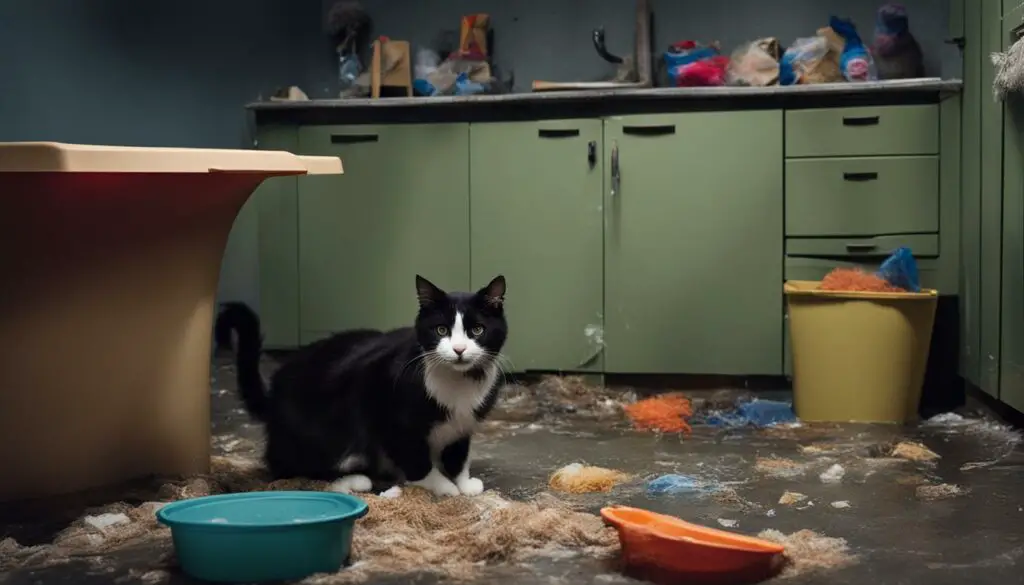As a cat owner, I know how important it is to keep a close eye on our furry friends. So, what do you do when you notice that your cat has diarrhea but seems otherwise fine? While it may be concerning, it’s essential to understand that diarrhea is not a normal condition for cats. However, in some cases, it could indicate a minor and temporary issue that can be addressed with proper care.
Diarrhea can be a sign of various underlying causes, and it’s crucial to pay attention to your cat’s behavior and take the necessary steps to ensure their well-being. In this article, we will explore the potential causes of diarrhea in cats, how to identify the symptoms, when to seek veterinary help, home care remedies, and the appropriate treatments to improve your cat’s digestive health.
Key Takeaways:
- Diarrhea is not normal for cats and should be addressed even if your cat seems otherwise fine.
- Common causes of cat diarrhea include dietary changes, food allergies, parasites, infections, and underlying conditions.
- Identifying the root cause of diarrhea is crucial for effective treatment.
- If your cat has diarrhea for more than 24 hours or shows signs of illness, it’s important to contact your vet.
- Home care measures for mild cases of diarrhea may include small, bland meals, access to fresh water, and probiotics.
Causes of Diarrhea in Cats
Diarrhea in cats can be caused by various factors, and understanding the underlying causes is crucial for effective treatment. Some common causes of cat diarrhea include:
- Sudden dietary changes: Cats have sensitive digestive systems, and a sudden change in their diet can lead to an upset stomach and diarrhea.
- Food allergies or intolerances: Certain ingredients in cat food can trigger allergic reactions or intolerances, leading to gastrointestinal issues.
- Intestinal parasites: Parasites like worms can disrupt the normal functioning of the digestive system and cause diarrhea.
- Infections: Bacterial, viral, or fungal infections can inflame the intestines and result in loose stools.
- Digestive disorders: Conditions like pancreatitis or inflammatory bowel disease can cause chronic diarrhea in cats.
Identifying the exact cause of diarrhea in your cat may require a veterinary examination and diagnostic tests, such as stool sample analysis or blood work. Once the underlying cause is determined, appropriate treatment can be administered to alleviate the diarrhea and restore your cat’s digestive health.
“Sudden dietary changes, food allergies, intestinal parasites, infections, and digestive disorders can all contribute to diarrhea in cats. Identifying the root cause is crucial for effective treatment.” – Veterinarian
To provide a visual representation, here’s a table summarizing the common causes of diarrhea in cats:
| Cause | Description |
|---|---|
| Sudden dietary changes | Switching cat food brands abruptly or introducing new foods without a gradual transition |
| Food allergies or intolerances | An adverse reaction to specific ingredients in cat food |
| Intestinal parasites | Worms or other parasites that infect the digestive system |
| Infections | Bacterial, viral, or fungal infections affecting the gastrointestinal tract |
| Digestive disorders | Conditions like pancreatitis or inflammatory bowel disease |
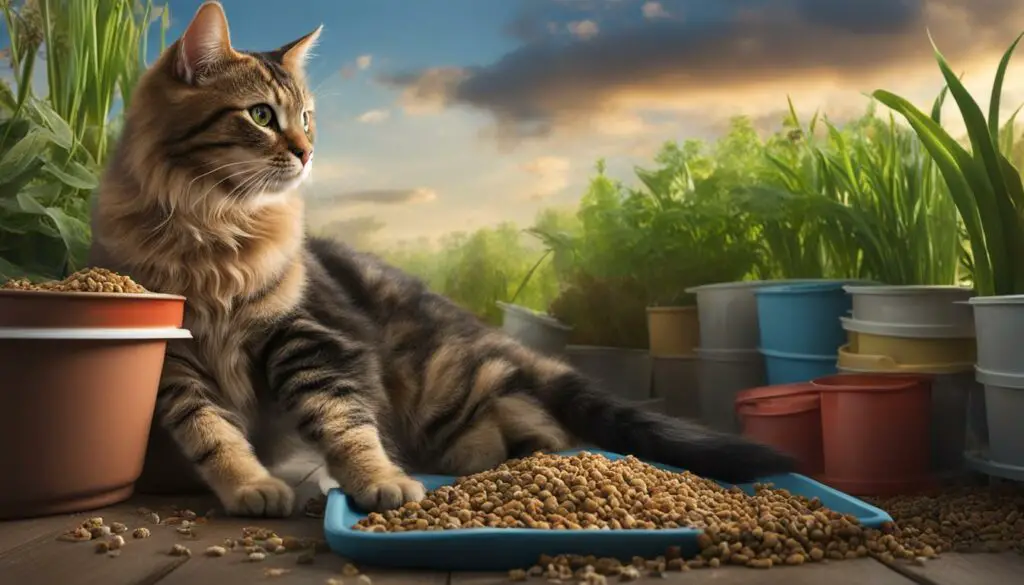
By understanding the causes of diarrhea in cats, you can take proactive measures to prevent and address this common health issue. If your cat experiences diarrhea, it is always advisable to consult with a veterinarian for a proper diagnosis and tailored treatment plan.
How to Identify Cat Diarrhea
When it comes to identifying cat diarrhea, it’s important to pay attention to your cat’s behavior and look out for certain symptoms. While your cat may seem fine overall, observing these signs can help determine if they are experiencing diarrhea:
- Loose or liquid stools
- Frequent trips to the litter box
- A dirty or smelly bottom
- Excessive cleaning of the anal area
- Gurgling stomach noises
- Farting
- Lethargy
- An unkempt coat
Even if your cat appears otherwise healthy, prolonged or severe diarrhea should not be ignored. It’s important to monitor the frequency and consistency of their stools to ensure their digestive health.
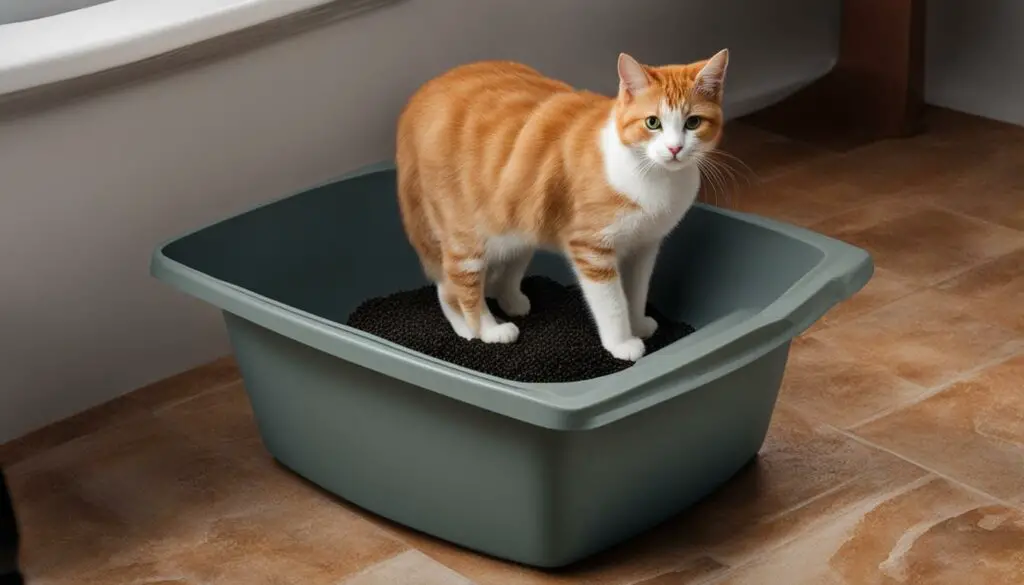
If you notice any of the above symptoms in your cat, it’s advisable to consult with your veterinarian for a proper diagnosis and treatment plan. Remember, early detection and intervention can help prevent potential complications and ensure your cat’s well-being.
When to Seek Veterinary Help
If your cat has diarrhea for more than 24 hours, shows signs of illness, or has other concerning symptoms like vomiting, blood or mucus in the stool, or a painful abdomen, it’s important to contact your vet. They can provide guidance on the appropriate course of treatment and ensure your cat’s overall health.
Diarrhea in cats can be caused by various factors, and determining the underlying cause is crucial for effective treatment. While some cases of diarrhea may resolve on their own, persistent or severe diarrhea should not be ignored as it can lead to dehydration and nutritional deficiencies.
If your cat’s diarrhea persists or worsens, it may indicate a more serious underlying condition that requires veterinary attention. Prompt intervention can help alleviate your cat’s discomfort and prevent further complications. It’s always better to be safe and consult your vet when in doubt.
Home Care for Cats with Diarrhea
When your cat has diarrhea but seems fine, there are several home care measures you can take to help alleviate their symptoms. It’s important to note that these remedies are suitable for mild cases of diarrhea, and if your cat’s condition worsens or persists for more than 24 hours, veterinary assistance should be sought.
One of the key aspects of home care for cats with diarrhea is to provide them with small, bland meals multiple times a day. This helps to ease the strain on their digestive system and allows for better absorption of nutrients. You can consider feeding them boiled chicken or boiled white fish, both of which are easy on the stomach.
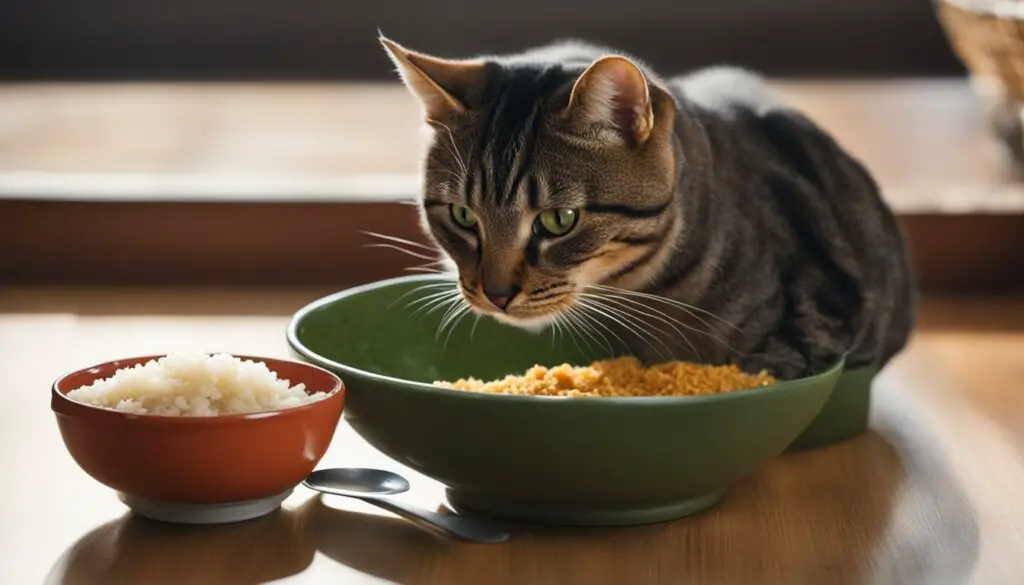
In addition to a tailored diet, it’s crucial to ensure that your cat has access to fresh water at all times. Dehydration can worsen diarrhea, so encourage your cat to drink by providing clean water in easily accessible bowls.
Rest is also important for cats with diarrhea. Make sure your cat has a quiet and comfortable space where they can rest undisturbed. Avoid excessive play or strenuous activities that can further stress their digestive system.
Probiotics can also be beneficial in supporting gut health. These supplements contain beneficial bacteria that help restore the natural balance in the digestive tract. You can discuss with your veterinarian to determine the appropriate probiotic for your cat’s specific needs.
Antibiotics and Cat Diarrhea
When it comes to treating cat diarrhea, antibiotics are not usually the first line of treatment. Unless there is an underlying bacterial infection causing the diarrhea, antibiotics may not be necessary and can even worsen the condition by disrupting the balance of gut bacteria. It’s important to consult with your veterinarian before administering any antibiotics to your cat.
Instead of antibiotics, your vet may recommend other treatments to address the root cause of the diarrhea and soothe the bowel. One common approach is the use of probiotics, which promote the growth of beneficial bacteria in the gut and help restore a healthy balance. Probiotics can be given orally in the form of capsules or powders, or can be found in specialized cat food formulated for digestive health.
In addition to probiotics, your vet may prescribe medications that can help manage the symptoms of diarrhea and promote healing of the digestive tract. These medications may include antidiarrheal agents to reduce the frequency and volume of stools, anti-inflammatory drugs to reduce inflammation in the intestines, or medications to address specific underlying conditions such as intestinal parasites or inflammatory bowel disease.
Quote:
“While antibiotics can be important in treating certain bacterial infections, they are not always the best solution for cat diarrhea. It’s crucial to consider the underlying cause of the diarrhea and work closely with your veterinarian to determine the most appropriate treatment plan.” – Dr. Smith, DVM
Table: Comparison of Treatment Options for Cat Diarrhea
| Treatment Option | Description | Effectiveness | Potential Side Effects |
|---|---|---|---|
| Probiotics | Help restore healthy gut bacteria and promote digestive health. | Effective for mild to moderate cases of diarrhea. | Minimal side effects, but may cause mild gastrointestinal upset in some cats. |
| Antibiotics | Only prescribed for bacterial infections causing diarrhea. | Effective for specific bacterial infections. | Potential disruption of gut bacterial balance and development of antibiotic resistance. |
| Antidiarrheal Agents | Help reduce frequency and volume of stools. | Effective for symptom management in some cases. | Possible constipation or bloating as side effects. |
| Anti-Inflammatory Drugs | Reduce inflammation in the intestines. | Effective for managing inflammation-related diarrhea. | Possible side effects with long-term or high-dose use. |
| Specific Treatments | Target underlying causes such as parasites or inflammatory bowel disease. | Effective for addressing specific conditions causing diarrhea. | Potential side effects vary depending on the treatment. |
Common Causes of Diarrhea in Cats
When your cat has diarrhea but seems fine, it can be concerning. Understanding the common causes of cat diarrhea can help you identify the underlying issue and provide appropriate care. Here are some common factors that can contribute to diarrhea in cats:
Dietary Changes:
Sudden changes in your cat’s diet, such as switching to a new brand or type of food, can disrupt their digestive system and result in diarrhea. It’s important to introduce new foods gradually to allow their bodies to adjust.
Dietary Intolerances or Allergies:
Just like humans, cats can have food intolerances or allergies. Certain ingredients or additives in their diet may cause an adverse reaction, leading to diarrhea. Identifying and avoiding these triggers can help manage their symptoms.
Ingesting Harmful Substances:
Cats are curious creatures and may consume substances that are toxic or indigestible. This can include plants, chemicals, medications, or even household items. Ingesting these substances can irritate the digestive tract and cause diarrhea.
Intestinal Parasites:
Parasites such as worms or protozoa can infect your cat’s gastrointestinal system, leading to diarrhea. Common parasites include roundworms, tapeworms, giardia, and coccidia. Regular deworming and proper hygiene can help prevent parasite infections.
Infections:
Bacterial, viral, or fungal infections can also cause diarrhea in cats. These infections may be acquired from contaminated food or water, contact with infected animals, or unsanitary living conditions. Seeking veterinary treatment is crucial to manage these infections and prevent their spread.
While these are some common causes of diarrhea in cats, it’s important to note that each cat is unique. Some cats may be more susceptible to certain triggers, while others may have underlying health conditions that contribute to their diarrhea. If your cat is experiencing prolonged or severe diarrhea, it’s best to consult with your veterinarian for a proper diagnosis and tailored treatment plan.
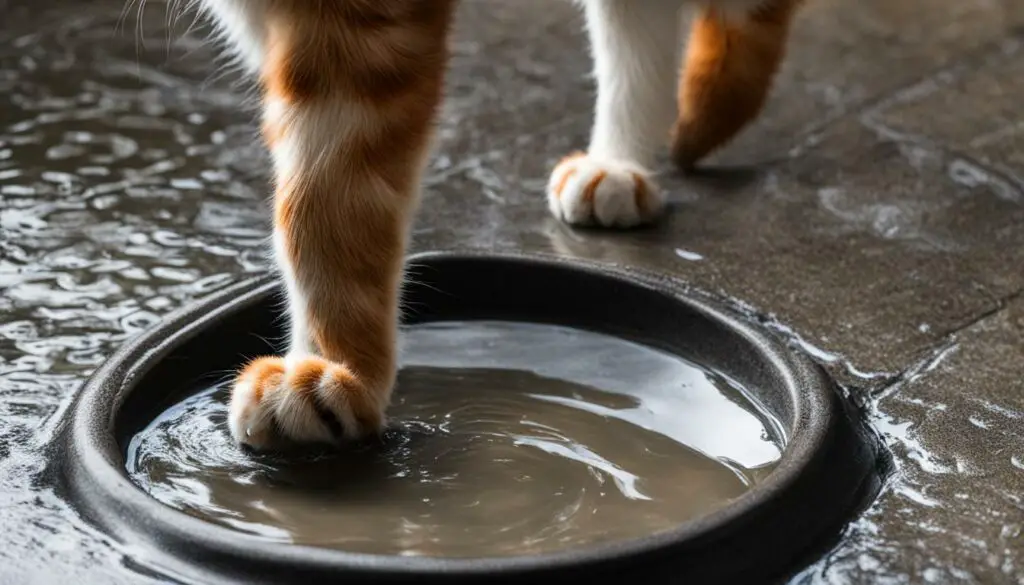
Seriousness of Diarrhea in Cats
When it comes to diarrhea in cats, the seriousness of the condition depends on the duration and severity of symptoms. While mild or occasional diarrhea may not be a cause for immediate concern, certain signs indicate a more serious underlying problem that requires prompt veterinary attention.
Severe diarrhea accompanied by other signs of illness, such as weakness, fever, dehydration, and loss of appetite, can indicate a more serious condition that needs immediate medical intervention. These symptoms may suggest an infection, inflammatory bowel disease, or other gastrointestinal disorders that require thorough diagnosis and appropriate treatment.
It’s important to remember that cats are experts at hiding signs of illness, so even if your cat seems fine despite having diarrhea, it is crucial to monitor their condition closely. If the diarrhea persists for more than a day, becomes more severe, or is accompanied by other concerning symptoms, contacting your veterinarian is recommended.
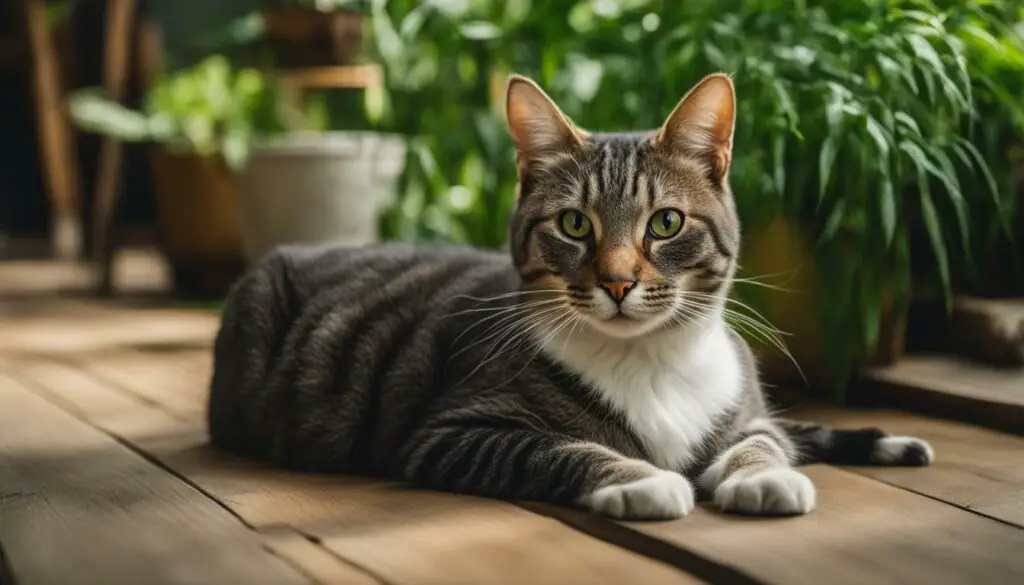
Recognizing the seriousness of diarrhea in cats:
- Severe, watery, or bloody diarrhea
- Weakness or lethargy
- Fever
- Dehydration (dry gums, sunken eyes, reduced skin elasticity)
- Loss of appetite
By being proactive in seeking veterinary care and addressing the seriousness of diarrhea in cats, we can ensure the well-being of our feline friends and promote their overall health.
Table: Common Signs of Seriousness in Cat Diarrhea
| Signs | Potential Causes |
|---|---|
| Severe, watery, or bloody diarrhea | Bacterial or viral infections, gastrointestinal disorders |
| Weakness or lethargy | Dehydration, electrolyte imbalances, underlying illness |
| Fever | Infections, inflammatory conditions |
| Dehydration (dry gums, sunken eyes, reduced skin elasticity) | Prolonged diarrhea, underlying health issues |
| Loss of appetite | Gastrointestinal disorders, systemic illness |
Diagnosing the Cause of Diarrhea
When your cat has diarrhea but seems fine, it’s important to understand the underlying cause in order to provide appropriate treatment. To diagnose the cause of diarrhea in cats, your veterinarian will follow a thorough diagnostic process, which may include:
1. Medical History Review
Your vet will discuss your cat’s medical history, including any previous episodes of diarrhea, recent dietary changes, vaccinations, and overall health. This information will help narrow down the potential causes and guide further diagnostic tests.
2. Physical Examination
A physical examination allows your vet to assess your cat’s overall health and identify any visible abnormalities. They will check for signs of dehydration, abdominal pain, bloating, and assess the condition of the coat and skin. Additionally, they may perform a rectal examination to check for any abnormalities in the rectum or colon.
3. Laboratory Tests
Your vet may request laboratory tests to further evaluate your cat’s condition. These may include:
- Stool sample analysis: By examining your cat’s stool, your vet can check for the presence of parasites, bacteria, or other infectious agents.
- Blood work: Blood tests may help identify underlying conditions such as pancreatitis, liver disease, or kidney problems that could be contributing to your cat’s diarrhea.
- Imaging studies: In some cases, your vet may recommend X-rays or ultrasounds to visualize the gastrointestinal tract and look for any abnormalities.
4. Dietary Trial
In certain situations, your vet may recommend a dietary trial to assess your cat’s response to different food types. This can help identify any food allergies or intolerances that may be causing the diarrhea.
| Diagnostic Method | Key Information |
|---|---|
| Medical History Review | Assess previous episodes, dietary changes, and overall health |
| Physical Examination | Check for visible abnormalities, signs of dehydration, and abdominal pain |
| Laboratory Tests | Stool analysis, blood work, and imaging studies |
| Dietary Trial | Assess response to different food types |
By conducting a comprehensive diagnostic evaluation, your vet can determine the underlying cause of your cat’s diarrhea and recommend an appropriate treatment plan. It’s essential to follow their guidance and provide the necessary care to help your cat recover and maintain their digestive health.
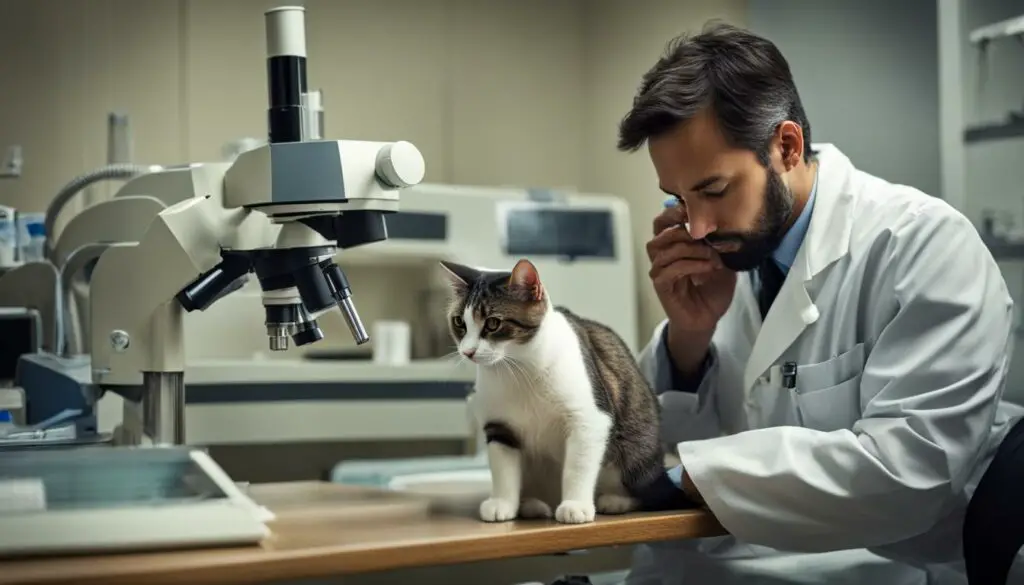
Treating Cat Diarrhea
When it comes to treating cat diarrhea, the approach depends on the underlying cause. For mild cases of diarrhea, simple home care measures can often be effective. This may include adjusting your cat’s diet, providing probiotics to support gut health, and ensuring they have access to fresh water.
In more severe or chronic cases of diarrhea, additional treatments may be necessary. Your veterinarian may prescribe medications to address specific issues, like anti-inflammatory drugs for inflammatory bowel disease or antibiotics for bacterial infections. They may also recommend changes to your cat’s diet, such as a switch to a prescription or hypoallergenic food.
It’s important to work closely with your vet to determine the most appropriate treatment plan for your cat. They will consider factors such as your cat’s overall health, the severity and duration of the diarrhea, and any potential underlying conditions. Regular monitoring and follow-up visits may be needed to ensure that the treatment is effective and to make any necessary adjustments.
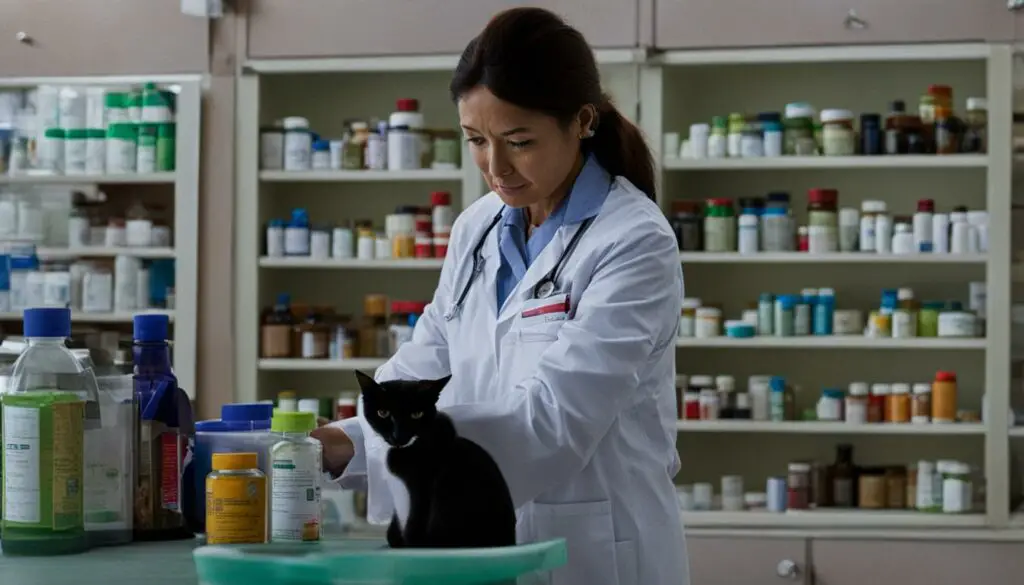
Table: Common Treatment Options for Cat Diarrhea
| Treatment Option | Description |
|---|---|
| Dietary Adjustment | A change in your cat’s diet to a bland or prescription food that is easier to digest. |
| Probiotics | Supplements containing beneficial bacteria to promote a healthy gut balance. |
| Medications | Prescription medications to address specific issues, such as anti-inflammatory drugs or antibiotics. |
| Dietary Modifications | A switch to a prescription or hypoallergenic food to address food intolerances or allergies. |
| Fluid Therapy | Intravenous or subcutaneous fluids to address dehydration in severe cases. |
| Specialized Treatments | Additional therapies, such as acupuncture or herbal remedies, that may be recommended in specific cases. |
Prognosis for Cats with Diarrhea
When it comes to the prognosis for cats with diarrhea, several factors come into play, including the cause, severity of symptoms, and the individual cat’s response to treatment. In most cases, simple diarrhea in otherwise healthy cats can resolve with appropriate management and care. However, chronic or recurrent diarrhea may require ongoing dietary management or long-term medical intervention to alleviate symptoms and improve intestinal health.
It’s important to remember that each cat is unique, and their response to treatment may vary. Some cats may recover quickly with minimal intervention, while others may require a more intensive approach. As a pet owner, it’s essential to work closely with your veterinarian to determine the underlying cause of your cat’s diarrhea and develop a tailored treatment plan.
By addressing the root cause and implementing appropriate treatment measures, the prognosis for cats with diarrhea can generally be positive. With proper care, monitoring, and ongoing communication with your vet, you can help ensure the well-being of your cat’s digestive system and overall health.
Table: Prognosis Factors for Cats with Diarrhea
| Prognosis Factor | Description |
|---|---|
| Cause of diarrhea | The underlying cause plays a significant role in determining the prognosis. Some causes may be more easily treatable than others. |
| Severity of symptoms | The severity of diarrhea, along with other accompanying symptoms, can impact the prognosis. Severe or persistent diarrhea may require more aggressive treatment. |
| Response to treatment | Each cat’s individual response to treatment is unique. Some cats may show improvement quickly, while others may require a longer recovery period. |
| Overall cat health | The overall health and underlying conditions of the cat can influence the prognosis. Cats with pre-existing health issues may have a more complicated course of treatment. |
While the prognosis for most cats with diarrhea is favorable, it’s crucial to closely monitor your cat’s progress and follow your veterinarian’s advice. If your cat’s symptoms worsen or persist despite treatment, it’s important to seek further veterinary guidance to ensure the best possible outcome for your furry friend.
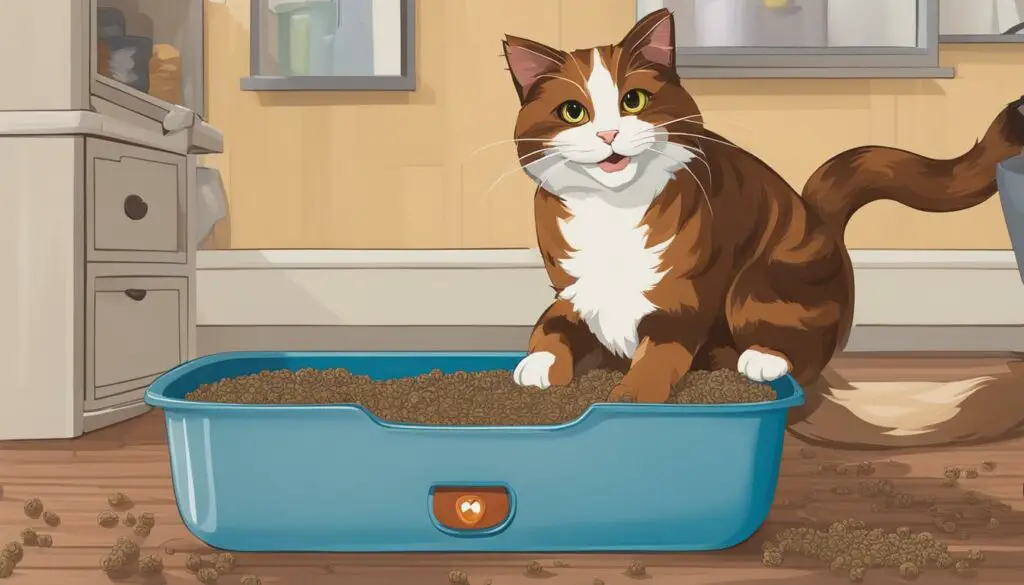
Over-the-Counter Supplements for Cat Diarrhea
If your cat is experiencing diarrhea, there are several over-the-counter supplements that may help alleviate their symptoms. These supplements can provide relief and promote a healthy digestive system. However, it is important to consult with your vet before using any supplements to ensure they are safe and appropriate for your cat’s specific condition.
One common supplement for cat diarrhea is pre+probiotics. Probiotics help restore the balance of good bacteria in the gut, which can be disrupted during episodes of diarrhea. They promote healthy digestion and can help regulate bowel movements. Prebiotics, on the other hand, provide nourishment for the probiotics and help them flourish in the gut.
Another supplement that can be used is an anti-diarrheal agent. These products contain ingredients that help firm up the stool and reduce the frequency of bowel movements. They provide relief from diarrhea symptoms and can help your cat feel more comfortable.
| Supplement | Benefits |
|---|---|
| Pre+probiotics | Restore the balance of good bacteria in the gut and promote healthy digestion. |
| Anti-diarrheal agents | Firm up the stool and reduce the frequency of bowel movements. |
| Gastrointestinal-supportive products | Provide additional support for the digestive system during episodes of diarrhea. |
In addition to pre+probiotics and anti-diarrheal agents, there are also gastrointestinal-supportive products available. These products contain ingredients that provide additional support for the digestive system during episodes of diarrhea. They can help soothe the gut and reduce inflammation, providing relief for your cat.
Remember, while over-the-counter supplements may provide temporary relief for cat diarrhea, it is important to address the underlying cause of the diarrhea and consult with your vet for proper diagnosis and treatment. Your vet can recommend the most appropriate supplements and treatment plan for your cat’s specific needs.
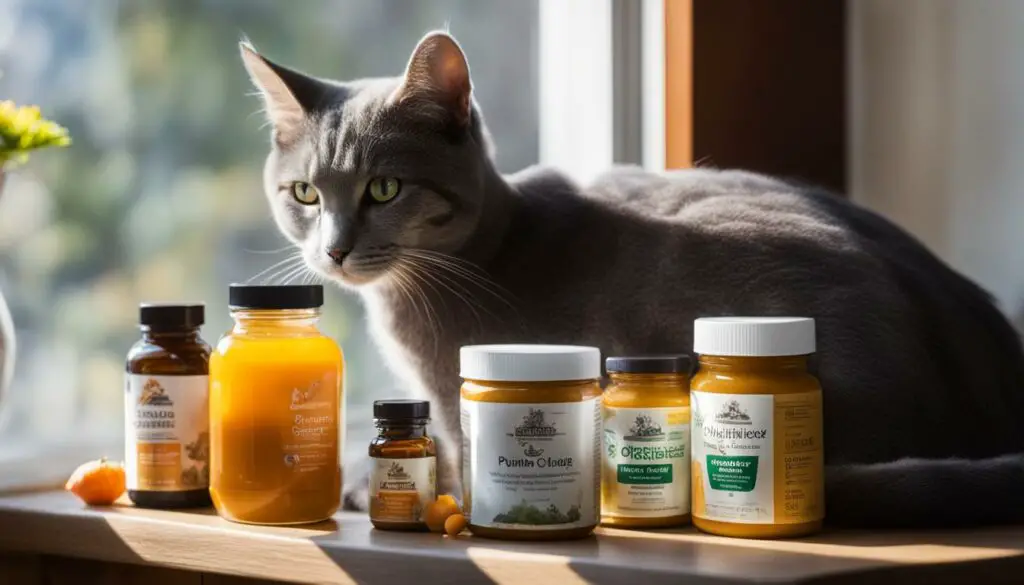
Can Diarrhea Spread to Other Cats?
When your cat is experiencing diarrhea, it’s natural to wonder if it can be passed on to other cats in your household. While diarrhea itself is not contagious, certain causes of diarrhea can be transmitted among cats. Understanding the potential for transmission and taking necessary precautions can help keep all your furry companions healthy.
Sources of contagious diarrhea in cats include parasites and viral infections. These can be spread through contact with contaminated food, water, litter boxes, or direct contact with an infected cat’s feces. It’s important to note that not all cases of diarrhea in cats are contagious, so it’s essential to identify the underlying cause to determine the risk of transmission.
To prevent the spread of contagious diarrhea among cats, it’s essential to practice good hygiene. This includes regularly cleaning litter boxes, disinfecting food and water bowls, washing your hands thoroughly after handling your cat or their waste, and separating any infected cats from healthy ones until they have fully recovered.
If you suspect that your cat’s diarrhea is contagious in nature, it’s important to consult with your veterinarian for a proper diagnosis and treatment plan. They may recommend specific medications or treatments to address the underlying cause and prevent further transmission to other cats in your household. Prompt veterinary care, along with appropriate hygiene practices, can help protect the health of all your feline companions.
Preventing the Spread of Contagious Diarrhea in Cats
Here are some important steps you can take to prevent the spread of contagious diarrhea among your cats:
- Practice good hygiene by washing your hands thoroughly after handling your cat or cleaning their litter box.
- Separate any infected cats from healthy ones until they have fully recovered.
- Regularly clean and disinfect litter boxes, food and water bowls, and any surfaces your cats come into contact with.
- Take infected cats to the veterinarian for a proper diagnosis and treatment plan to address the underlying cause of their diarrhea.
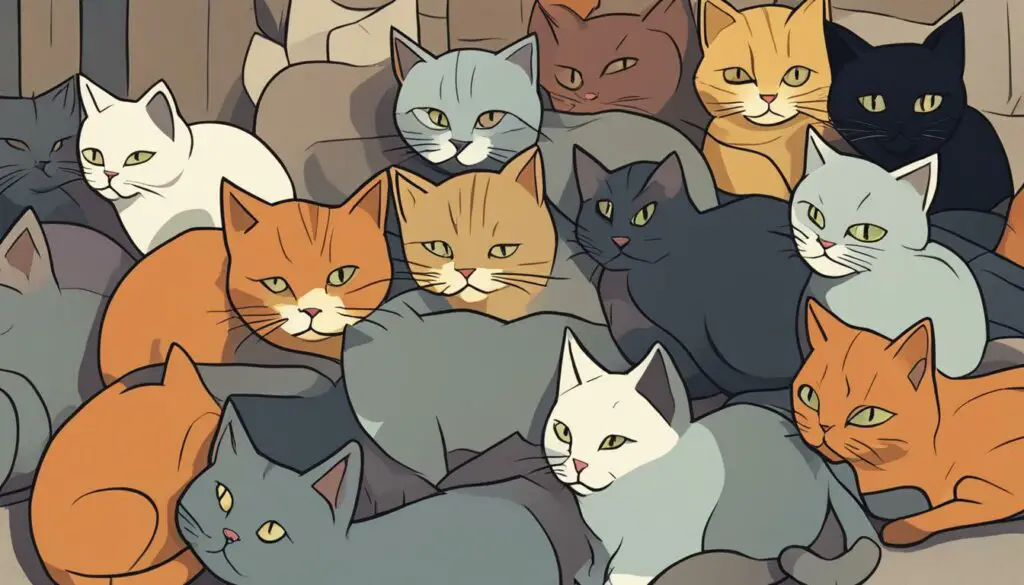
| Cause | Transmission Method |
|---|---|
| Parasites (such as Giardia or Coccidia) | Contaminated food, water, or litter boxes |
| Viral Infections (such as Feline Panleukopenia or Feline Calicivirus) | Direct contact with an infected cat’s feces or bodily fluids |
Duration of Cat Diarrhea
If your cat is experiencing diarrhea but seems otherwise fine, it’s important to understand the duration of this condition and when to seek veterinary attention. The length of cat diarrhea can vary depending on the cause and the individual response to treatment.
In some cases, diarrhea may resolve within a few hours or a couple of days, especially if it was caused by simple dietary changes or temporary digestive disturbances. However, if the diarrhea persists for more than a day or is accompanied by other concerning symptoms such as vomiting, blood in the stool, or lethargy, it is crucial to contact your veterinarian for guidance.
Monitoring the duration of cat diarrhea is essential because prolonged or severe diarrhea can lead to dehydration, nutrient deficiencies, and weight loss. Additionally, persistent diarrhea may indicate an underlying health issue that requires medical intervention. It’s always better to err on the side of caution and seek professional advice to ensure the well-being of your feline companion.
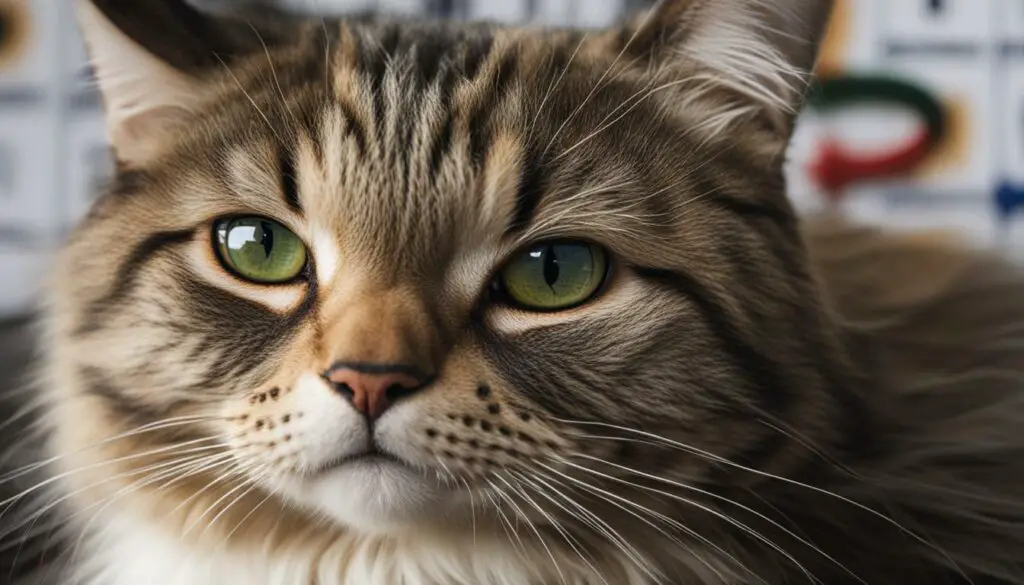
If you notice that your cat’s diarrhea does not resolve within a reasonable timeframe or worsens despite home care measures, your veterinarian will be able to provide a thorough evaluation and recommend appropriate treatment options. By identifying and addressing the underlying cause of the diarrhea, your vet can help your cat recover and restore their digestive health.
Conclusion
If your cat has diarrhea but seems fine, it’s important to take action and address any underlying issues. Diarrhea is not a normal condition for cats, and it can indicate a variety of health problems.
Pay attention to the symptoms of cat diarrhea, such as loose or liquid stools, frequent trips to the litter box, and excessive cleaning of the anal area. Even if your cat appears otherwise healthy, prolonged or severe diarrhea should not be ignored.
Contact your vet if your cat experiences diarrhea for more than 24 hours, shows signs of illness, or has other concerning symptoms like vomiting, blood or mucus in the stool, or a painful abdomen. They can help diagnose the cause and provide appropriate treatment options.
Remember, the treatment for cat diarrhea will depend on the underlying cause. In some cases, simple measures like dietary adjustments and probiotics may be enough. However, for more severe or chronic cases, additional medications or specialized treatments may be necessary to improve your cat’s digestive health.
FAQ
Is diarrhea a normal condition for cats?
No, diarrhea is not a normal condition for cats. It can indicate an underlying issue.
What are the signs of cat diarrhea?
Signs of cat diarrhea may include loose or liquid stools, frequent trips to the litter box, a dirty or smelly bottom, gurgling stomach noises, and lethargy.
When should I contact my vet about my cat’s diarrhea?
You should contact your vet if your cat has diarrhea for more than 24 hours, shows signs of illness, or has other concerning symptoms like vomiting, blood or mucus in the stool, or a painful abdomen.
What can I do at home to help my cat with diarrhea?
At home, you can try feeding small, bland meals multiple times a day, providing access to fresh water, and considering probiotics to support gut health.
Are antibiotics commonly prescribed for cat diarrhea?
No, antibiotics are not commonly prescribed for cat diarrhea unless there is an underlying bacterial infection. Inappropriate use of antibiotics can worsen diarrhea.
What are the common causes of diarrhea in cats?
Common causes of diarrhea in cats include sudden changes in diet, food allergies, intestinal parasites, infections, and inflammatory bowel disease.
How serious is diarrhea in cats?
The seriousness of diarrhea in cats depends on the duration and severity of symptoms. Severe, bloody diarrhea accompanied by other signs of illness requires immediate veterinary attention.
How is the cause of diarrhea in cats diagnosed?
To diagnose the cause of diarrhea in cats, your vet will review the cat’s medical history, perform a physical examination, and may request further tests such as stool sample analysis and blood work.
What is the treatment for cat diarrhea?
The treatment for cat diarrhea depends on the underlying cause. In mild cases, dietary adjustment, probiotics, and supportive care may be sufficient. More severe or chronic cases may require additional medications and dietary modifications.
What is the prognosis for cats with diarrhea?
The prognosis varies depending on the cause, severity, and individual response to treatment. Most cases resolve with appropriate management, but chronic or recurrent diarrhea may require ongoing treatment.
Are there over-the-counter supplements for cat diarrhea?
Yes, there are over-the-counter supplements available such as pre+probiotics and gastrointestinal-supportive products. Consult with your vet before using any supplements.
Can diarrhea spread to other cats?
Certain infectious causes of diarrhea can be spread to other cats. Take precautions to prevent potential transmission if your cat has diarrhea.
How long does cat diarrhea usually last?
The duration of cat diarrhea can vary widely. Mild cases may resolve within a few hours or days, while persistent diarrhea requires veterinary attention.
Source Links
- https://www.veterinarians.org/cat-has-diarrhea-but-seems-fine/
- https://vcahospitals.com/know-your-pet/diarrhea-in-cats
- https://www.pdsa.org.uk/pet-help-and-advice/pet-health-hub/conditions/diarrhoea-in-cats

